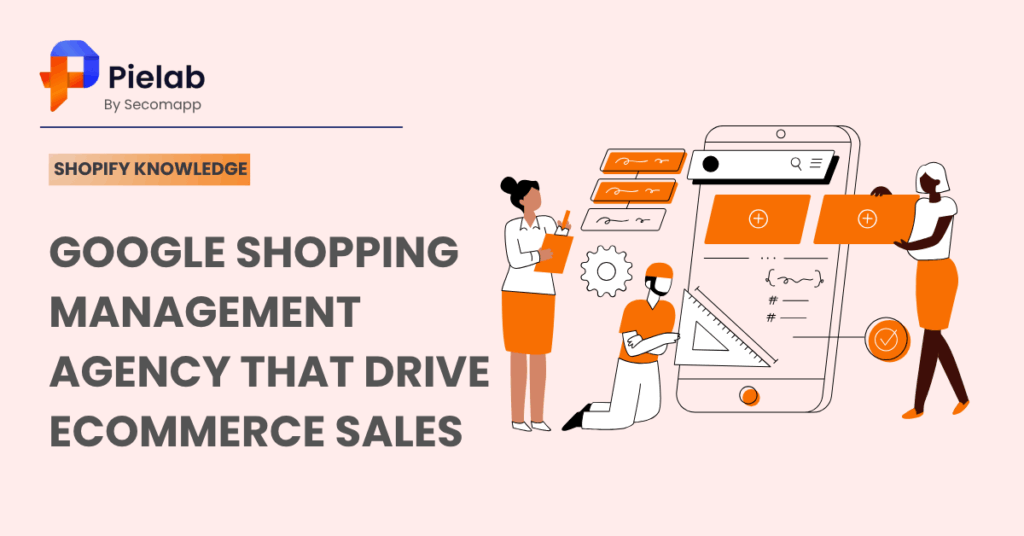Google Shopping management was introduced in 2002. Since then, it has helped countless users streamline their product visibility, reach high-intent shoppers, and optimize advertising performance across Google’s retail ecosystem.
But only if you know how to navigate Google Shopping management properly. With years of hands-on experience across all kinds of Ecommerce businesses, one of the best way to get the most out of this tool is to work with a professional Google Shopping management agency.
Below, we delve into the world of Google Shopping, and how you can maximise your sales with Google Shopping Management Agency.
What are Google Shopping management services?
Google Shopping management services help you ensure your products show in Google Shopping for the appropriate searches. They can also help maximize your ads’ click-through rates (CTR) and the number of sales you get from them.

What does a Google Shopping Management agency do?
Google Shopping (which used to be called Product Listing Ads), is a free tool that lets businesses showcase their physical products on the search engine results page (SERP) or under the ‘Shopping’ tab. With this game-changing approach, potential customers can view your products before even visiting your website.
Google Shopping results include:
- An image of the product
- The product’s name
- The retailer’s name
- The product’s price
- Other relevant information

These results sometimes show up at the top of the main search engine results page (SERP) for a query, and users can also navigate to the Shopping tab from the main SERP.
Why your business needs expert Google Shopping Management agency?
Why should your business use Google Shopping to advertise its products? Here are some of the top benefits.
1. Increased visibility on Google
Google Shopping ads often appear at the very top of SERPs for product-related searches, so they’re the first thing users see. Additionally, their visual format, combined with semantic keyword clustering, helps you stand out in crowded SERPs.
2. A more extensive presence
A SERP may display multiple shopping ads from a single retailer. Additionally, a text ad, a shopping ad, and an organic result from your website can all appear on the same SERP.
Shopping ads can boost your traffic from a single search term and give you another way to connect with Google users.
You can connect with leads who are actively looking for products similar to yours by using Google Shopping ads. In your shopping ad, you can also provide users with the information they require to complete a purchase, assisting leads in making a decision before they even reach your website.
3. Data accessibility
Google Shopping also makes it simple to obtain comprehensive data regarding the effectiveness of your advertisements. You can use this information to identify your best-selling items and enhance your advertising campaigns.
For instance, you can obtain information about the number of clicks on advertisements for particular goods. You only need to filter your product view to obtain this information.
How do agencies manage Google Shopping?
PPC agencies typically assign account managers to handle multiple clients. Specialist agencies may have certified experts focused on Google Shopping, which can boost performance—but their narrow focus can lead to a disconnected strategy, with poor cross-channel alignment and limited data sharing.
Full-service agencies, on the other hand, may offer broader consistency across channels. However, their generalist teams often lack deep expertise in any one area, meaning your campaigns could be outperformed by competitors with more specialized partners or larger budgets—especially in the highly competitive Google Shopping carousel.
Another concern is data ownership. Some agencies control access to performance data, requiring you to request reports rather than offering full transparency. This often leaves retailers questioning the accuracy of what they’re shown.
Finally, account managers often split their time across many clients, so attention to your campaigns may be limited. To manage workload, most agencies rely heavily on automation tools.
Scripts, spreadsheets and third-party tools
Many PPC agencies rely on automation tools—like scripts, spreadsheets, and third-party platforms—to streamline account management. These tools help automate reports, suggest optimizations, and handle bulk actions.
While useful for small product catalogs, scripts often require manual review from a Google Shopping expert. As your inventory grows, these tools can become overly complex, with rules clashing or being ignored, leading to inefficiencies and performance issues.
PPC agencies and Google Smart Shopping
Smart Shopping, now replaced by Performance Max, was popular due to its simplicity, automation, and no-cost setup. It handled bidding automatically and required minimal input.
However, its “black box” nature limited access to performance and search data—making it hard to analyze what’s working. Despite this, some agencies still prefer Smart Shopping for its time efficiency, but it’s not always the best option for businesses needing transparency and full control.
Google Shopping agency fees
Agency fees are typically based on a percentage of ad spend (usually 5–15%), a flat monthly fee, or a combination of both.
Spend-based pricing scales with budget but can create a conflict of interest—agencies might avoid reducing ad spend, even if it improves efficiency. Flat fees offer more predictability and encourage smarter spending, but they require clear scope agreements. Without strong account management, clients may feel under-supported when extra help is needed.
Agencies that don’t balance effort and pricing often struggle financially or are forced into difficult mid-contract renegotiations.
Which Google Shopping Management Agency Is Right for Your Business?
Choosing the right Google Shopping management agency isn’t just about who offers the lowest cost or the flashiest reports — it’s about finding a partner that understands your products, your target audience, and your growth goals.
1. WebFX
WebFX is a full-service digital marketing agency with strong expertise in Google Shopping management. They handle everything from product feed optimization to ROI-focused campaign structures. Their team focuses on maximizing ROAS and uses detailed analytics to refine campaign performance.
Best for: Mid-size to enterprise-level businesses looking for a performance-driven partner.
2. Disruptive Advertising
Known for its data-driven approach, Disruptive Advertising specializes in PPC campaigns, including Google Shopping. They offer ongoing A/B testing, bid optimization, and tailored ad strategies to suit your product catalog.
Best for: Brands that want aggressive optimization and personalized strategy.
3. Logical Position
Logical Position is a Google Premier Partner agency with a dedicated team for eCommerce. Their Google Shopping service includes feed management, campaign segmentation, and regular performance reviews. They also offer SEO and email marketing for a full-funnel approach.
Best for: Shopify and BigCommerce users who want multi-channel growth support.
Conclusion
While Google Shopping management agencies provide valuable expertise and campaign support, their services can be costly—especially for smaller businesses or startups. Therefore, choosing the right Google Shopping management agency or app is very crucial and needs to be considered thoroughly. It depends on your goals, budget, and level of control.

